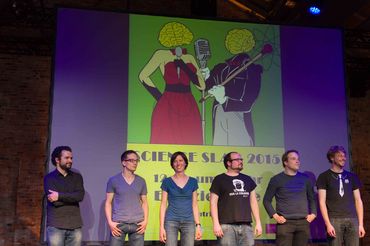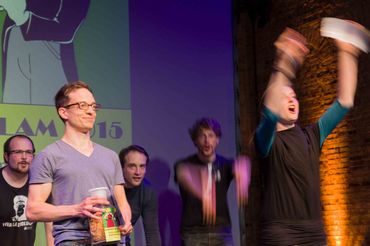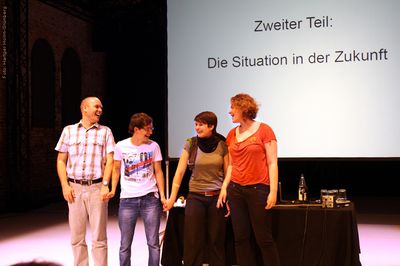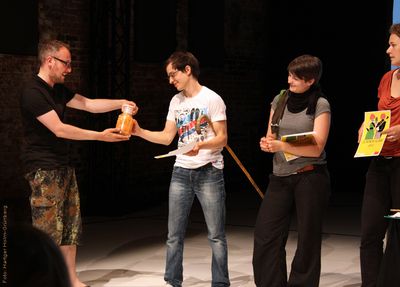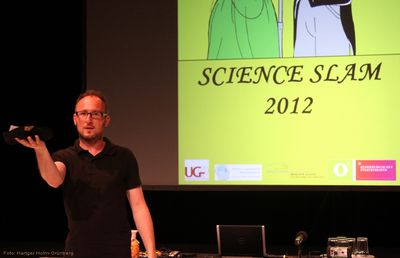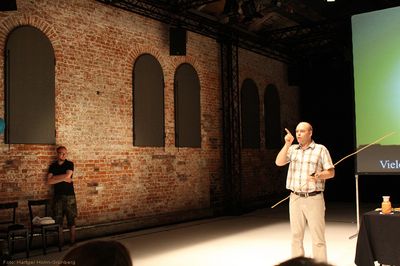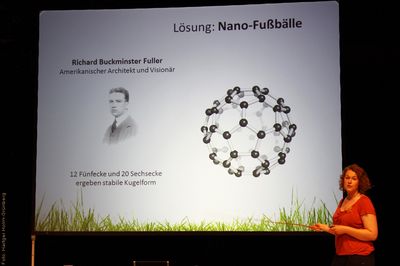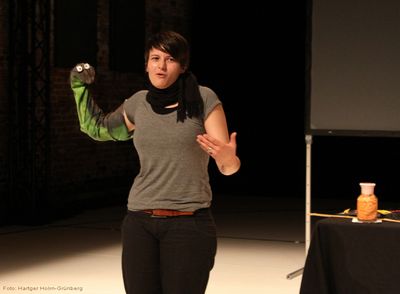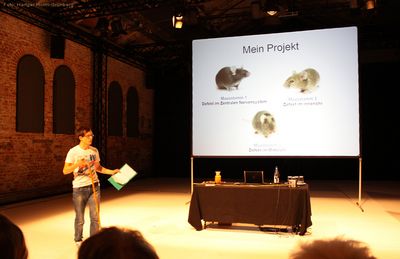Science Slam
Contact
Executive Director
Manangement
Science Slam
12th Oldenburg Science Slam as part of the Festival Programm for the 50th University Anniversary
Science Slam on 29th May 2024 at 7 p.m. in the Aula of the University!
The Oldenburg Science Slam is part of the festival program for the 50th anniversary of the University of Oldenburg. The date for this has already been set: there will be slamming again in the university auditorium (A11) on May 29, 2024 from 7 p.m.!
The organizing team is currently in the process of putting together a colorful and varied program to the delight of the numerous interested audience.
And like every year, we are looking for students, doctoral candidates and post-docs who would like to take part in the Slam competition with their research topics.
We don't leave anyone alone in advance and offer two slam information events (online), a preparation workshop for interested slammers on April 11, 2024 (registration via Stud.IP: elearning.uni-oldenburg.de/dispatch.php /course/details?sem_id=b3a166512102edfa666ff1b49f0af4cc&again=yes) and individual coaching for each individual before the Slam performance.
As every year, there are many prizes to be won: the established main prize of the Oldenburg Science Slam “The Golden Brain”, the University Graduate Academy Prize as well as subscriptions to scientific journals and other sponsorship prizes.
And don't forget - all brave Slammys will be rewarded with lots of adrenaline, fame and applause!!!
THE REGISTRATION FOR THE EVENT IS OPEN.
Internal guests, i.e. students, doctoral candidates and employees of the University of Oldenburg, can now register via Stud.IP: elearning.uni-oldenburg.de/dispatch.php/course/details
External guests should send a short, informal email with all the names of the guests to scienceslam@uol.de. You will be added to our guest list and can enjoy the evening with us. All external registrations receive a written confirmation by email.
Admission is from around 6.30 p.m. Free choice of seats applies.
Further questions and ideas can be expressed by email: scienceslam@uol.de
7. Science Slam on 17.05 2017 everything went perfect
The 7th Science Slam of the University of Oldenburg is now history. It was a wonderful evening with great slam guests, funny power point karaoke and a great crowd.
The Orga-Team would like to thank all slammers, sympathetic moderators and all supporters of the annual Science Slam !!!!
Nina Gassmann
(on behalf of the organization Team)
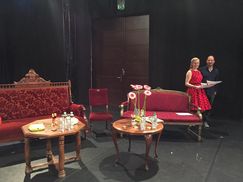
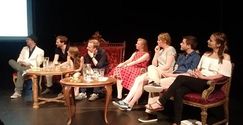
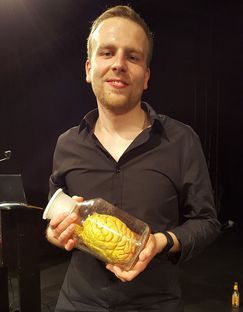
Young junior scientist from the neurosciences wins the big prize at the 6th Science Slam
Sold-out 6th Science Slam of the University on 30. Mai 2016
On Saturday, students and young scientists from the University of Oldenburg gave around 150 spectators an entertaining and informative evening in the drill hall of the Oldenburgisches Staatstheater. In front of a sold-out house they competed against each other at the 6th Science Slam of the University. The audience voted on the winners - after their scientific content and entertainment value and three "slammers" could go home with a prize: Bianca Brüggen, Maurits Halbach and Oliver Richter.
On Monday evening, the individual Slam contributions dealt with the question of whether fishes have a three-second memory and a cartoon that illustrates the distinction between nature and society in a graphic way. In addition, viewers learned what a particularly sensitive light microscope can reveal about the retina, why the model of the economic cycle is in conflict with physical laws, and how the bond between pastors and church members could be strengthened in the future. The colorful variety of topics was exemplary for the wide-ranging and interdisciplinary research fields that are researched and taught at the University of Oldenburg.
The winners at a glance:
1st place: Bianca Brüggen (PhD student, Neurosensory Unit / Dept. of Neuroscience, FK VI), "Super Mario Bros. Are you on the same page?", Grand Prize of 500 euros, donated by the University Society Oldenburg (UGO)
2nd place: Maurits Halbach (student, AG Biodiversity and Evolution of Animals), "ClownfishCircus", 150 Euro and a journal subscriptions, donated by the Graduate Academy and the Spektrum der Wissenschaft publishing company
3rd place: Oliver Richter (PhD student, Economics / FK II: Computer Science, Economics and Law), "The Perpetuum Mobile in Science and Practice", trade magazine subscription, donated by the Spektrum der Wissenschaft publishing company
Other participants:
Petra Strohmann (PhD student, Marketing, Business Administration, Faculty 2: Computer Science, Economics and Law) and
Yen Sulmowski (scientific MA, Scientific Center "Genealogy of the Present", FK IV)
The organizers of the event were the Neurosensorik Research Center, the Oldenburg State Theater, the Graduate Academy of the University of Oldenburg, the Graduate Schools of Humanities and Social Sciences (3GO) and of Science and Technology (Oltech) and the DFG Research Training Group Sensorybio.
The biggest sponsor of the event was the University Society Oldenburg (UGO); "Spektrum der Wissenschaft Verlagsgesellschaft mbH" sponsored several subscriptions for the event participants.
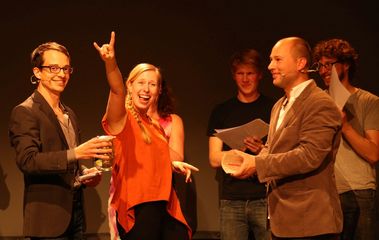
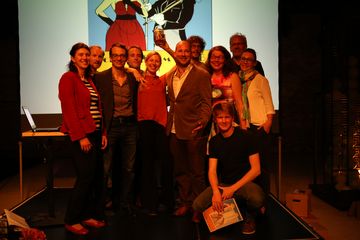
Science Slam 2015
On the 12. Mai 2015, the 5th Science Slam of the Carl von Ossietzky University Oldenburg took place.
The event was organized by the Neurosensorik Research Center, the SensoryBio Research Training Group and the Graduate Academy in cooperation with the Oldenburgisches Staatstheater. The audience in the sold-out parade hall was allowed to enjoy the entertaining mediation of highly complex scientific contexts. The five doctoral and post-graduate slammers presented a wide variety of topics: Derik Behrens from the Zoophysiology and Behavior Research Group reported on the orientation of desert ants to the position of the sun. As a trained physicist, Oliver Richter astonished the audience with his economics-oriented PhD thesis at the Institute for Chemistry and Biology of the Sea. Junior Professor Jannika Mattes described to the interested audience the stony path of an innovative idea before it becomes a success, with the introduction of a new medication. Jörg Robin explained to everyone the physical background of amplification through stimulated emissions of light, causing lasers. The last slammer, Nicolas Palanca Castan, illustrated the function of the brain using mathematical models or the brain processes of a barn owl.
Very colorful mix of topics and young researchers, who were rated by the audience with rapturous applause.
Derik Behrens convinced by his sovereignty on the stage and by the witty way of his science mediation and was named Science Slam winner 2015.
Congratulations!
Science Slam celebrates 5th birthday
Science Slam in the parade hall celebrates its fifth birthday - € 150 in prize money
For the 5th time on May 12, 2015, the Science Slam of Young Scientists from the University of Oldenburg will take place. This time, the slam is organized by the Research Center for Neurosensorics (FZN), the graduate school SensoryBio and the Gaduiertenakademie in cooperation with the Oldenburgisches Staatstheater.
At the Science Slam, the (up-and-coming) scientists have 10 minutes to get the audience excited about their research question. For quality and originality, the public awards Science Points for knowledge transfer and Slam Points for Entertainment. Anyone who was able to convey scientific facts and current research results to the public in the best way possible can go home with a prize money of 150 euros from the Graduate Academy.
Last year, slammers from neurobiology and hearing research, planktology and biology as well as techno-mathematics were present. This year, participants from the humanities and social sciences are also welcome.
The slammers will be supported and prepared in advance by the science journalist and poetry slammer Tim Schröder in a workshop on 24.04.2015. Participation in the workshop is not a formal requirement to register as a Slammer.
So if you still secretly watch the program with the mouse, or wonder how to explain your own research at the next party, you are also welcome to register for the Science Slam 2015 by e-mail at beate.gruenberg@uol.de like the ones who already loved the format after the last Science Slam.
Science Slam 2014
Few organizers can boast of having to send interested guests back home. It is even more amazing when it comes to a scientific event that entertains in a fun way hard scientific facts and research results, thus forming a broad audience and presenting the latest scientific findings. The Science Slam of the Forschungszentrum Neurosensors (FZN), the Graduate School of Natural Science and Technology (OLTECH), the Research Training Group Sensorybio and the Center for Lifelong Learning (C3L) took place on May 20, 2014 in cooperation with the Oldenburgisches Staatstheater.
This year, slammers from neurobiology and hearing research, planktology and biology, as well as techno-mathematics, started and were judged by the audience according to two criteria: the scientific value and the entertaining nature of their performance.
For the first time in the history of the Oldenburg Science Slam, the audience chose a scientist, the biologist Laura Verbeek, as the winner of the evening. She thus secured the trophy "The Golden Brain" as well as a travel voucher for participation in a seminar. The runner-up Michael Bottesch received a training voucher from the Center for Lifelong Learning, the other participants received small consolation prizes.
Audiences like Slammer agreed - Science Slam is cool and next year no interested guests will be sent home!


Michael Bottesch wanted to "embrace" the audience...

Mathias Knauer loved everybody...

Heidi Wichmann started fast…

Laura Verbeek marched through ponds, pots and meadows with rubber boots and that's what gave her victory.
Congratulations to all participants and especially the radiant winner!
Science Slam 2013
This year's Science Slam began with an exclusive interview with the star guest of the last slam, the leech Knut.
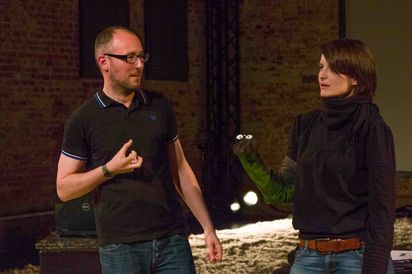
So attuned to the audience was pleased with the great presenter Mario Filsinger on four contributions. The audience was so large that the parade hall was not only filled to the last seat, but also many interested parties could only follow the slam from the Foyer.
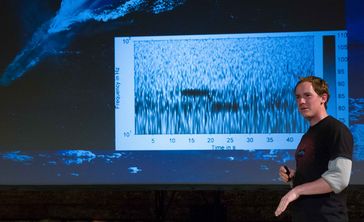
Sebastian Menze - guest slammer of the Alfred Wegener Institute in Bremerhaven - convinced the jury with his presentation "Walisch für Anfänger" about seal and whale song in the Antarctic.
The three Oldenburg slammers all come from working groups of the Neurosensory Research Center and show how complex this research focus is.
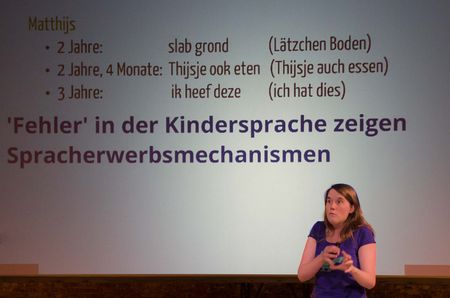
Sara Jonkers gave an insight into the language acquisition of the modal verbs in Dutch and fortunately was able to answer her initial question whether all Dutch children were "dictators" with no, because the frequent use of the word "moeten = must" only serves the development of language.
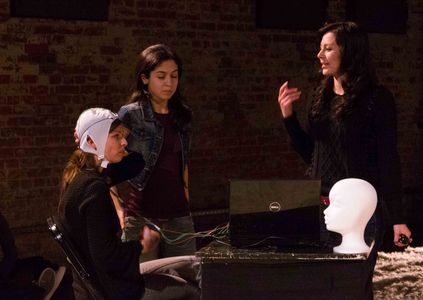
Stefanie Enriquez-Geppert demonstrated a kind of neuro feedback training. With her colleagues, she was able to show in the live EEG that just by introducing a "rotating laptop", the theta-wave activity in the brain can be increased. Such a self-directed increase in activity causes an increase in everyday cognitive performance - and to the delight of all students present - even while learning for one
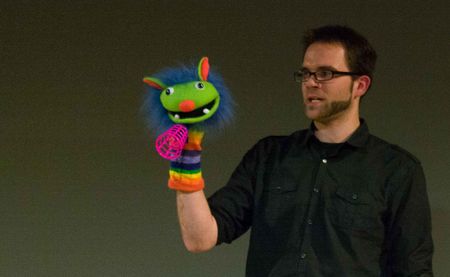
Steffen Kortlang thrilled the audience with his alien from the OHR-ION. He let the audience hear different sound examples and was amazed by the good-listening audience. The alien and the audience were taken on a short trip to the psychoacoustics lab and analyzed the data. Whether it was the spontaneous healing of the alien - or the fresh, happy way in which Steffen Kortlang was for his topic - he was in any case the winner of the evening and was allowed to take home the "golden brain".
All slammers visit the local NDR studio in June and then enjoy a nice meal together thanks to the numerous donations!
All photos: Hartger Holm-Grünberg
Science Slam 2012 - "The golden brain"
All photos: Hartger Holm-Grünberg
Derik Behrens has encouraged all people with hearing problems that the investigations with "his" mice will soon facilitate the analysis of hearing problems and enable a differentiated diagnosis.
Science Slam 2011 - Perfect mix between science and show
Von Mark Brueggemann | 24. August 2011 |
Present science in an entertaining way - that's what science slams are all about, which are now being organized in many German university cities. On Tuesday evening the Oldenburger Slammer met in the club "Polyester". The public interest in the competition of the academic entertainers was great.
"How many changers are here?" Moderator Mario Filsinger asks in the round. About two-thirds of the visitors to the Science Slam raise their hands. Filsinger is satisfied. "People also live and research in Wechloy," he notes. "We want to show this evening." And how. Three junior researchers from the Wechloy campus and Toralf Neuling as lonely fighter from the Campus Haarentor are arguing for the title of the best science slammer tonight. The evening was organized by the Graduate School of Science and Technology, the Research Center for Neurosensorics and the Collaborative Research Center Transregio 51 Roseobacter of the Carl von Ossietzky University.

Mario Filsinger
Another survey shows that many guests of the event are for the first time on a so-called slam. That's why Filsinger quickly explains the rules: the young researchers deliver a science show for ten minutes - then the audience votes. "In Germany, there sometimes seems to be an incompatibility decision between science and entertainment," says Filsinger. You want to change that with evenings like this. "And you are all AStA tonight."
From Guttenberg to Nobel Prize level
In fact, the so-called AStA - it means the jury - then consists of five groups, which come together from the audience. After each performance they stretch a spiral notebook with scores of one to ten. "One means zu Guttenberg level," explains Filsinger in advance. "Three to four is very nice - at some point it should be sufficient for a junior professorship, but a ten is the ticket to the Nobel Prize." In addition, there are in the blocks of the jury still comments to choose from, which are also held up diligently: "Hello Mama!", "Marry me!" and, Guttenberg affair and no end: "were you that?"
The scientific community is here for you this evening. The lot shows that first Irene occurs, then successively Nadine, Robin and Toralf. Before the competitors are allowed on stage, Thomas Greve shows how it works. The employee of the Institute of Physics and winner of the Hannover Slam-Competition talks about "hydrothermal Carbonisation" (HTC) vor. First he packs a cabbage called "Flatterbinse" into the saucepan. He does not heat it up to 200 degrees, which would actually be necessary in his self-developed biotron reactor. The principle of his HTC research but he explains eloquently and entertaining: The biomass heats up continuously in the reactor itself, the heat goes straight back into the process, and it produces coal. In contrast to other processes completely CO2-neutral.

Irene van den Heuvel
After the Flutterbinse, it's time for the Red-bellied Shrike. He is studying biology doctoral student Irene van den Heuvel. The African bird owes its name to the fact that he likes to choke out indigestible food leftovers. But that's not van den Heuvel's topic: her research question is why not only the males but also the females of the red-bellied warbler sing - in a duet. There are various hypotheses for this "duet" - from the common defense of the area, to the guarding of the partner, to mutual partner recognition. "Probably the duets serve to make the partners recognize each other and not the wrong thing on the beak," explains van den Heuvel. 34 points she gets from the already sweaty audience in densely filled "polyester". Maybe a slammer should have given a lecture on ventilation concepts in small event rooms?
"Animal" is also in the following lecture. Nadine Jacobs from the Institute for Pure and Applied Chemistry comes on stage with toy duck. Her topic is the "Ententanz in the beaker". "Chemists are not artists, they need templates for every drawing," the doctoral candidate anticipates - and then explains how diagrams with electrodes (cyclic voltammetry) give rise to diagrams in the shape of a duck. The jury also says "22 points" after repeated voting - moderator Mario Filsinger makes it clear that he expected more.

Toralf Neuling
Why his perception falls to sleep every 10 seconds, Toralf newcomer from the Department of Psychology asked. He investigates this with the help of electroencephalography, a method for measuring electrical brain activity. The voltage fluctuations at the head surface are recorded. Neuling's presentation is worth 35 points to the audience - and thus it is certain that the previous speaker won the competition: Robin Knecht from the Institute of Physics wrote a drama based on the effects of solar cells on the model of Shakespeare's "Romeo and Juliet". "The Most Excellent Lamentable Tragedy of Electreo and Holiet" is the title of the powerpoint-based "piece", with 38 points for it. Knecht does not only secure the Science Slam trophy - a brain in the glass - but also a congress scholarship of more than 1000 Euro.
Picture below: The winner Robin Knecht All pictures: mbr



